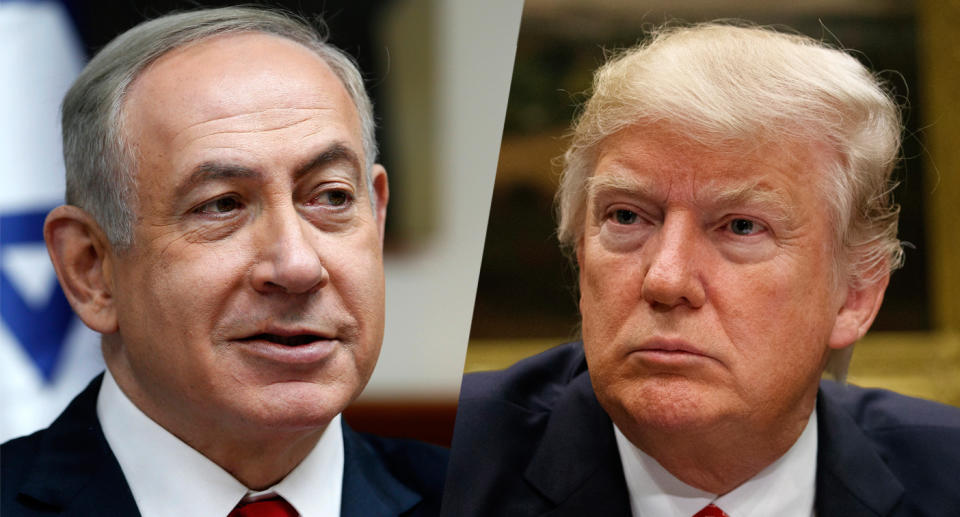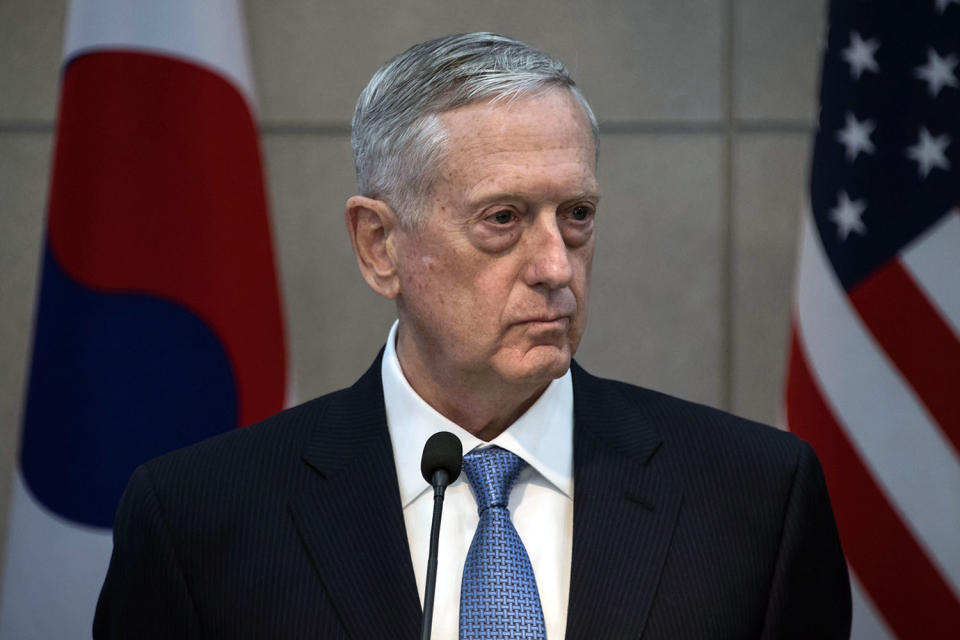With Netanyahu visit, Trump faces difficult test on Israel this week
Donald Trump this week could become the latest president to backtrack on a campaign-trail promise to move the U.S. Embassy in Israel from Tel Aviv to Jerusalem. Or he could become the first president to make good on that pledge, at the risk of unleashing chaos in America’s relationship with the Arab world.
Moving the embassy would mean that the U.S. formally recognizes Jerusalem as Israel’s capital, undermining Palestinian hopes of anchoring a future state in the eastern part of the city — and thereby potentially making it impossible to restart stalled Middle East peace talks. Already, Arab allies have warned Trump against the move, while Israel has encouraged him, at least in public.
A decision could come by Wednesday, when the unpredictable president hosts Israeli Prime Minister Benjamin Netanyahu at the White House. A day later, the Senate Foreign Relations Committee will grill Trump’s pick to be U.S. ambassador to Israel, bankruptcy lawyer David Friedman.
Throughout the 2016 campaign, Trump vowed to move the embassy. In the statement announcing his nomination, Friedman said he looked forward to working “from the U.S. Embassy in Israel’s eternal capital, Jerusalem.” And just days before his inauguration, Trump reportedly responded to a journalist asking him about his pledge by saying, “You know I’m not a person who breaks promises.”
But the president has, since taking office, eased off his campaign-trail certainty that the diplomatic mission should move. A 1995 law makes it U.S. policy to relocate the embassy to Jerusalem, but successive presidents have used their waiver authority under the legislation to delay doing so, worried about scuttling Arab-Israeli peace efforts. Barack Obama’s last waiver lapses in June — roughly when Israelis celebrate a holiday commemorating Jerusalem reunification.

“The embassy is not an easy decision,” Trump told the Israel Hayom daily in an interview this week. “It has obviously been out there for many, many years, and nobody has wanted to make that decision. I’m thinking about it very seriously, and we will see what happens.”
That echoed Trump’s hedging in a January 29 interview with Christian broadcaster CBN. While “there is certainly a chance” that he’ll move the embassy, the president said, “this has two sides to it; it’s not easy to do it — it’s not easy — and I will make a decision over the not-too-distant future.”
Trump could also try to find what might be seen as a middle path — recommitting the U.S. to moving its diplomatic mission in Israel but without a clear timetable for doing so. Or he could let his future ambassador to Israel work out of the modern diplomatic facilities the U.S. maintains in Jerusalem, without formally calling his office an embassy. Because of the size of those facilities, there would be no immediate need to build a new embassy, a step that would require Congress to approve money.
The question of whether to move the embassy is just one of many looming over Trump’s stated goal of resetting relations with Israel — and especially with Netanyahu. The prime minister clashed constantly with Obama on a personal level. Bilateral relations were more complex, as Obama chased the Iran nuclear deal over Netanyahu’s fervent and public opposition, while the U.S. stepped up military and intelligence cooperation with its staunch Middle East ally.
As a candidate, Trump promised to tear up the Iran nuclear deal, and expressed support for Israeli settlements in the West Bank. It’s not clear whether the president agrees that Middle East peace requires the establishment of an independent Palestinian state, a position dubbed the “two-state solution.” White House officials have ducked repeated questions about whether he endorses that approach, and a recent written statement mildly critical of Israeli settlements notably omitted any reference to it.
The two-state solution would see Israel and the Palestinians work out their borders and the status of Jerusalem. Israel claims the city as its capital, but the Palestinians want East Jerusalem as their capital.
Still, Trump recently criticized Israel for pushing ahead with new home construction in the West Bank, using language that hints at support for the two-state approach.
“They [settlements] don’t help the process. I can say that. There is so much land left. And every time you take land for settlements, there is less land left,” he told the Israel Hayom daily this week. “I am not somebody that believes that going forward with these settlements is a good thing for peace.”

Defense Secretary James Mattis is known not to favor the embassy move, seeing it as an unnecessary provocation that could inflame anti-American sentiment across the Arab world. And a Trump aide recently told Yahoo News that opposition to the embassy move from Jordan’s King Abdullah carried weight with the White House.
Jordan’s Foreign Minister Ayman al-Safadi said after talks in Egypt last week that the king had taken up the issue when he met informally with Trump in Washington on February 2.
“In our view, Jerusalem is extremely important; our firm stance is that we reject any unilateral efforts that attempt to change the Arab, Muslim and Christian identity of the holy city,” Safadi said. “This stance has been clearly articulated by his majesty, and we have conveyed our viewpoint on the outcome of any decision that threatens the identity of Jerusalem clearly and honestly to the United States administration.”
In his final press conference, Obama did not directly address the embassy question, but warned that “when sudden unilateral moves are made that speak to the core issues or sensitivities of either side [in the Middle East], that can be explosive.”
The sensitivities of the issue are clear on official government websites. The CIA’s World Factbook says this under the entry for Israel’s capital: “Jerusalem: note – while Israel proclaimed Jerusalem as its capital in 1950, the international community does not recognize it as such; the US, like all other countries, maintains its embassy in Tel Aviv-Yafo.” (Over at the State Department, the page that normally would include such details is “currently being updated.”)
The issue led to some infamously awkward moments in the Obama White House, including a back-and-forth in which White House spokesman Jay Carney tried to duck the question. And the White House changed a transcript of Obama’s eulogy for the late Israeli president Shimon Peres, striking “Israel” from a dateline that read “Jerusalem.”
Read more from Yahoo News:


